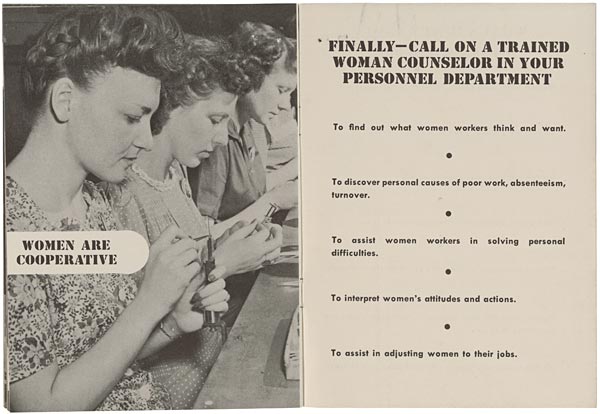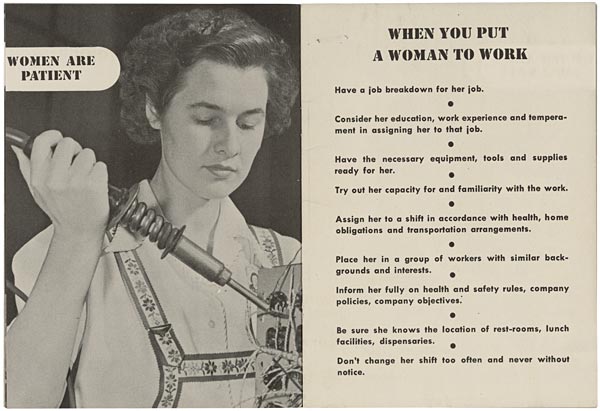Naama Nagar sent in these images from a “booklet that was intended to assist male bosses in supervising their new female employees at RCA plants,” according to the National Archives, Southeast Region (found via Michael Zilberman’s history blog; sorry it’s in Hebrew):
Text:
When you supervise a woman…Make clear her part in the process or product on which she works. * Allow for her lack of familiarity with machine processes. * See that her working set-up is comfortable, safe and convenient. * Start her right by kindly and careful supervision. * Avoid horseplay or “kidding”; she may resent it. * Suggest rather than reprimand. * When she does a good job, tell her so. * Listen to and aid her in her work problems.
Text:
Finally–call on a trained woman counselor in your personnel department…to find out what women workers think and want. * To discover personal causes of poor work, absenteeism, turnover. * To assist women workers in solving personal difficulties. * To interpret women’s attitudes and actions. * To assist in adjusting women to their jobs.
Text:
When you put a woman to work…Have a job breakdown for her job. * Consider her education, work experience and temperament in assigning her to that job. * Have the necessary equipment, tools and supplies ready for her. * Try out her capacity for and familiarity with the work. * Assign her to a shift in accordance with health, home obligations and transportation arrangements. * Place her in a group of workers with similar backgrounds and interests. * Inform her fully on health and safety rules, company policies, company objectives. * Be sure she knows the location of rest-rooms, lunch facilities, dispensaries. * Don’t change her shift too often and never without notice.
These are interesting from a gender perspective, of course, but they’re also sort of fascinating for what they tell us about changing assumptions about what the workplace is (or should be) like. While there were many problems with the World War II (and post-war) workplace, there was also a certain assumption that companies would take care of their employees to some degree in return for employees’ loyalty and hard work. This comes through in instructions such as “Assign her to a shift in accordance with health, home obligations and transportation work” and “Don’t change her shift too often and never without notice.” The idea is that workplaces, including factories, should think about their employees’ lives and how their work schedules fit in with their other obligations, as well as provide things like dispensaries. Now, I’m sure many companies didn’t actually meet these ideals, but this booklet sent out to managers at least acknowledges that they exist. Today, most workplaces don’t even pretend to aspire to such ideals. While some privileged white-collar workers may have options like flexible hours or working from home, many workers find that their hours and schedules change from week to week, making it difficult to arrange child care or work around other obligations. McDonald’s is well known for making workers sign out during slow periods during their shift to keep payroll down (workers are expected to be available, however, should business pick back up) and Wal-Mart has been sued for failing to pay overtime or for asking workers to work off the clock, again to reduce payroll costs.
So these might be useful for a discussion of work and what we expect from the worker-employer relationship. Is it simply a contractual financial exchange? Do workers and employers owe each other anything besides an hour of work and an hour of pay at the agreed-upon price? How have employers pushed concerns about schedule disruptions and payroll reductions off on workers, forcing them to accommodate the company’s needs?
Thanks, Naama!






